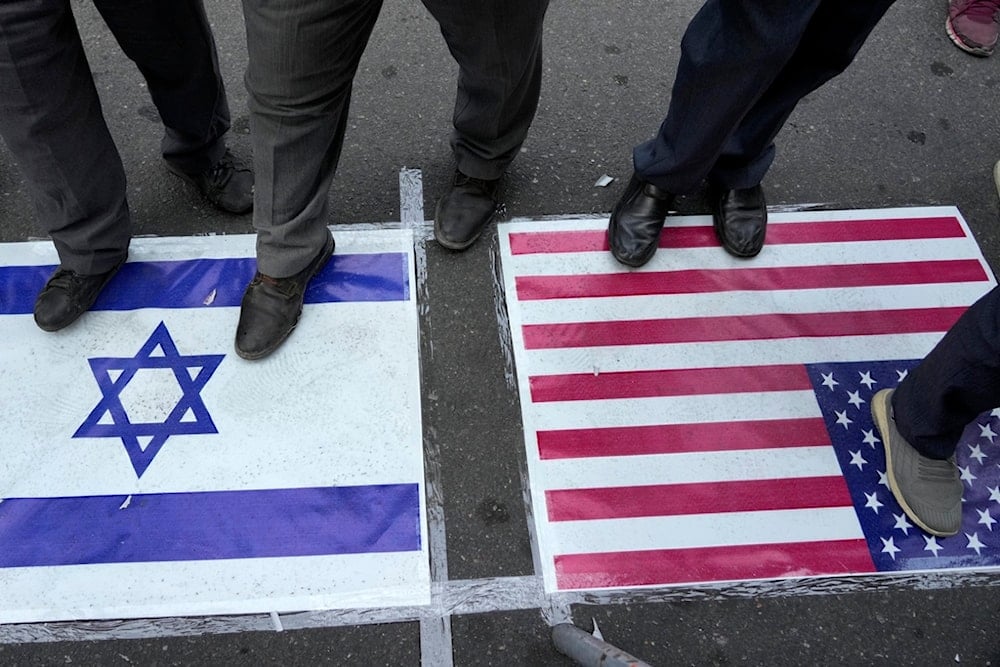Arab, Muslim leaders shift regional stances amid US admin change
The United States is bracing for Trump's return to office, and so is the Gulf as it takes a harsher stance against "Israel" in favor of Palestine and Iran.
-

Iranian demonstrators stand on representations of the US and Israeli flags in an anti-Israeli gathering at Felestin (Palestine) Square in Tehran, Iran, Tuesday, October 8, 2024 (AP)
As Donald Trump fine-tunes his Middle East policy ahead of his second presidential term, Arab and Muslim countries united in the Extraordinary Arab-Islamic Summit to propose a new roadmap for peace against the backdrop of the Biden administration's unconditional support to "Israel," Le Monde reported Tuesday.
On Monday, November 11, in Riyadh, a joint declaration was made by member states of the Arab League and the Organization of Islamic Cooperation (OIC), calling for an immediate ceasefire in Gaza and Lebanon. The roadmap also reiterated the "two-state solution" as central to restoring stability in the region.
Frustrated by the lack of influence over US policy, particularly the Biden administration's inability to constrain its Israeli ally amid the ongoing genocide, Arab and Muslim leaders have spoken out. The aggression has already led to more than 43,000 martyrs in Gaza and over 3,200 in Lebanon, with the risk of broader regional escalation, including potential confrontations with Iran.
A year after the first summit under Saudi leadership, which ended in division, the new initiative calls for an arms embargo on the Israeli occupation and a suspension of its membership in the United Nations General Assembly.
The statement condemns the occupation's military actions in Gaza, its expansion into Lebanon, and its violations of the sovereignty of Iraq, Syria, and Iran. It also criticizes the international community's inaction and calls for urgent humanitarian intervention to end the suffering caused by the Israeli siege and collective punishment of Gaza's civilian population.
Condemning 'Israel'... and its foes
In his speech, Saudi Crown Prince Mohammed bin Salman (MBS) denounced the occupation's actions, condemning the genocide in Gaza and its heavy toll on Palestinian civilians, especially women and children. MBS emphasized that the Saudi position toward the Israeli occupation had hardened, and reiterated the Kingdom's longstanding demand for a Palestinian state based on the 1967 borders with East al-Quds as its capital.
The Saudi leadership has also extended an invitation to other nations to join the international coalition for a "two-state solution," which Saudi Arabia is spearheading in partnership with the European Union and Norway.
MBS voiced strong support for Iran, calling for international action to ensure the Israeli occupation respects Iran's sovereignty and refrains from further aggression. However, he condemned Iran's support for Resistance movements like Hamas, Hezbollah, and Ansar Allah.
Hope for Trump change
Trump's return to the White House raises expectations in the Gulf, with hopes that his relationship with Israeli Prime Minister Netanyahu and his transactional approach may help broker ceasefires in Gaza and Lebanon.
However, analysts warn that tensions could arise between Trump and Saudi Arabia over policy toward Iran. The kingdom's recent rapprochement with Tehran, facilitated by Chinese mediation, contrasts with Trump's “maximum pressure” campaign against Iran during his first term.
On the same day as the Riyadh summit, Crown Prince Mohammed bin Salman spoke with Iranian President Masoud Pezeshkian, signaling a shift in Riyadh's stance toward Tehran. The Saudi chief of general staff also visited Tehran to discuss cooperation, reflecting a new era of bilateral engagement between the two regional powers.
This comes after a Bloomberg report indicated that Trump's foreign policy team would look to expand the so-called "Abraham Accords", the landmark agreements brokered during his first term that normalized relations between "Israel" and several Arab nations.
Yet, the road to including Saudi Arabia may prove challenging; bin Salman has indicated that progress toward a Palestinian state is a prerequisite for normalization.

 4 Min Read
4 Min Read








